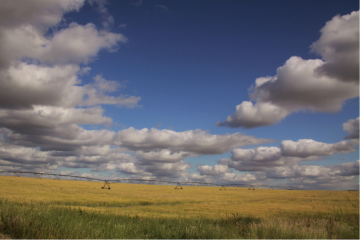The future of agriculture in the Mediterranean is threatened with increased droughts, water scarcity, heat waves, storms and changes in seasonal climate patterns. The Common Agricultural Policy (CAP) is intended to support and guide the development of agriculture in the European Union. But how has the CAP promoted adaptation to climate change at the local, regional and national level? And how can it do this better in the future? These are some questions that were posed to farmers, farmers’ organisations and experts in Portugal, from March to September 2014, by BASE partner FFCUL. The interviews revealed very different evaluations of the past of CAP and gave plenty of constructive ideas for the future.
By André Vizinho, Rui Barreiro and Ana Lúcia Fonseca, FFCUL, Portugal
Nature will adapt to climate change, as it has for millennia. But the need for planned adaptation in agriculture and forestry in the Mediterranean reflects the need to preserve the socio-economical functions of the landscapes and ecosystems that support our livelihoods, our culture and our society. Society is currently highly dependent on the goods and services currently offered by forest and agriculture ecosystems (1).
In Portugal, one third of the forest area is a multifunctional forest, called “Montado” where cork oaks and holm oaks are predominantly combined with non-irrigated agriculture (mainly winter cereals) and grazing (2). With the investment in large dams like the Alqueva, more than 100 000 hectares are newly available for irrigated agriculture. This has created a feeling of water abundance in some parts of the Alentejo, while at the same time 58% of the country (mainly in the Alentejo region) remains at high risk of desertification (3).

Figure 1: Photo of the Alqueva Dam in the Alentejo, Portugal and the Montado system. Photo by Rui Ornelas, 2011
In order to obtain ‘bottom-up’ information on how agriculture can adapt to climate change and how this can be supported by the CAP, a set of interviews were made with Portuguese farmers and other individuals in the agriculture sector. The interviews were conducted together with a questionnaire common to the other agriculture case studies in BASE (read more about Denmark and the Czech Republic).
- “Today,(…) farmers are very careful applying phytopharmaceuticals, following environmental regulations, conserving the NATURA 2000 network and bird fauna. This is something that wasn’t seen before. (…) Some of the things that were allowed 20 years ago would be environmental crimes today.” (Representative of farmers’ organisation).
- “Yes, because through subsidies we are obliged to protect the environment. For example, here we are forbidden to plow and mobilize the soil for winter cereals [due to erosion risk]. We get money based on the area and therefore we don’t have to damage the land producing winter wheat” (Farmer in integrated farming programme).
The main arguments stating that the CAP has been a barrier to the adaptation of agriculture to climate change explain that due to strong financial incentives farmers, tend to react more to incentives than to the market or climate or their farms’ characteristics.
- “The farmer got used to receiving this money and it became part of his income. He never questioned if what he was producing was the best or if he should produce something different or if he should sell to a different market” (Representative of farmers' organisation)
Another argument states that the subsidies incentivise practices that are bad for the soil, the environment and adaptive capacity to climate change:
- “The farmers that do more pollutant activities per hectare receive more money (for example producing more heads of cattle per hectare), diminishing the adaptive capacity to climate change.” (Organic cattle farmer).

Figure 2: Photo of rainfed cereal agriculture, Alentejo, Portugal. 2014. Photo by André Vizinho
- “I think the European Union should help unite agricultural policies and scientific and innovative policies; it should be one of its responsibilities. I think it’s very difficult for farmers to invest without the help of a national or European policy” (Former minister of agriculture).

- Promoting significant diversity of crops and biodiversity;
- Paying the same amounts to farmers in the different countries of EU for the same service;
- Promoting water harvesting in the landscape;
- Properly managing the application of the greening measures;
- Promoting soil regeneration
- Eradicating the use of chemical fertilizers on the soil
- Creating two different kinds of agriculture (large scale and small scale) and giving different supports and incentives to each
- Taxing the farmers through IRS on a 5 year basis, to include the costs of risk management
- The CAP should invest in awareness raising to consumers
- Promoting more agricultural labour and less mechanization
- Promote more water efficiency;
- Promoting more integrated farming.
Conclusions
References
- Regato, P., IUCN Centre for Mediterranean Cooperation, Food and Agriculture Organization of the United Nations, 2008. Adapting to global change: Mediterranean forests. IUCN Centre for Mediterranean Cooperation, Malaga, Spain.
- Belo, C.C., Pereira, M.S., Moreira, A.C., Coelho, I.S., Onofre, N., Paulo, A.A., 2009. Montado.
- MAMAOT, 2013. Estratégia de adaptação agricultura e floresta às alterações climáticas - Portugal Continental.




